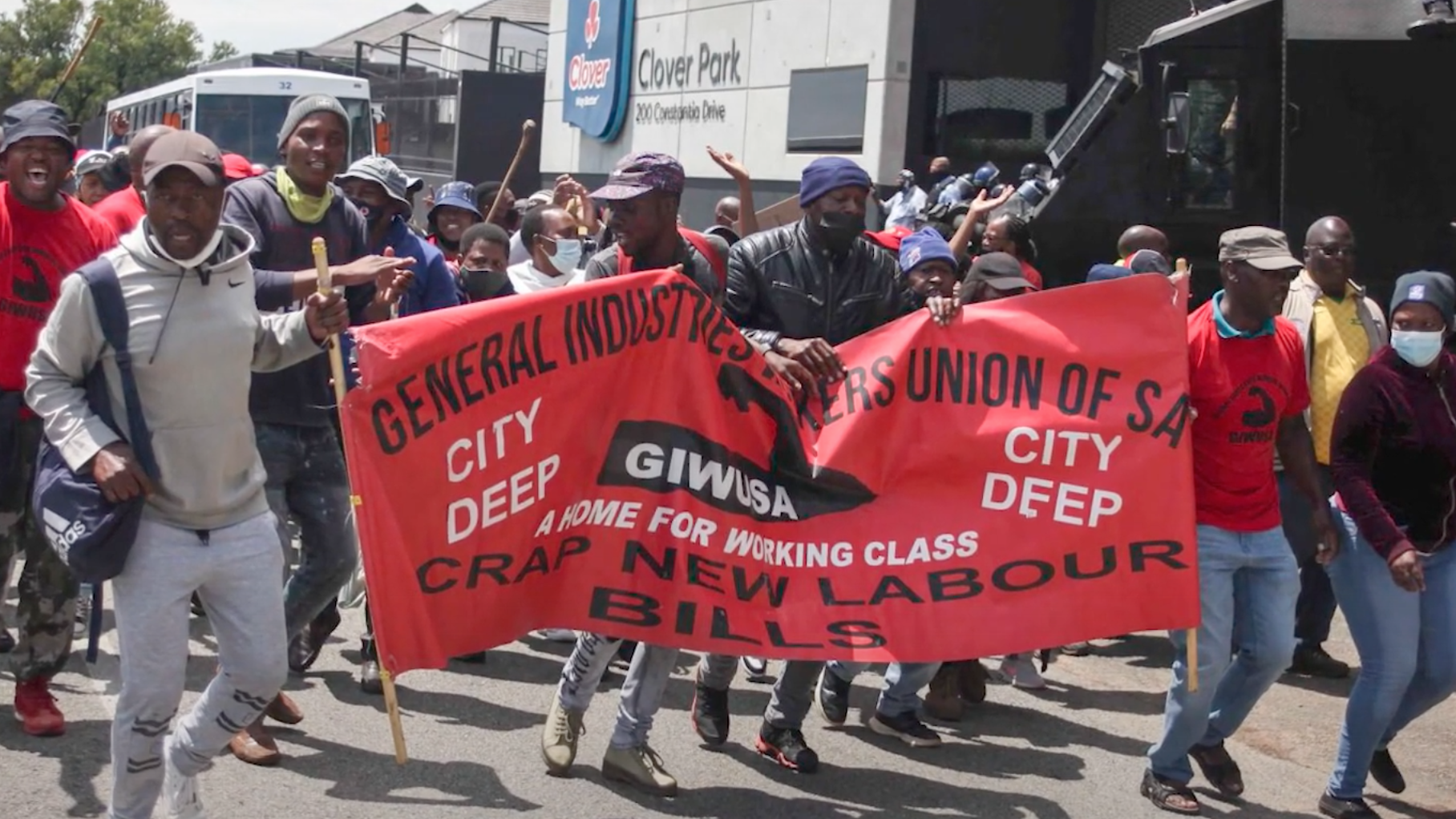An inquiry looms over South Africa’s largest and oldest dairy sector employer, Clover, as the ongoing strike by 5,000 of its workers entered into the 45th day on Thursday, January 6. In a protest against Clover’s retrenchment and restructuring plans affecting thousands of jobs, workers have downed tools since November 22.
South African unions assert that the retrenchments the company is due to carry out are in violation of the conditions imposed on Clover by the Competition Tribunal in September 2019, while approving its merger with Milco, 60% of which is owned by the Israeli Central Bottling Company (CBC).
The General Industries Workers Union of South Africa (GIWUSA) and the Food and Allied Workers Union (FAWU), which are jointly leading the strike, have elaborated their complaints in a written submission to the Competition Commission during a meeting on Tuesday, January 4.
“The Competition Commission has assured us that they will investigate our complaints. They maintained that Clover’s annual report submitted in November appeared to be on the surface compliant with the conditions imposed on the merger. But on the basis of the detailed submissions we have made, they are going to ask further questions,” GIWUSA’s president, Mametlwe Sebei, told Peoples Dispatch.
The complaint begins by reminding the Commission that, based on its recommendations, the Tribunal had approved the merger “despite opposition by labor”. Objections on the grounds that CBC was in violation of international law by operating in illegally occupied Palestinian territories were not considered by the Tribunal, which deemed the matter to be out of its jurisdiction.
The unions at the time had also objected to the merger, pointing to the adverse impact it was “certain to have on employment and working conditions of the thousands” of workers. A restructuring plan called Project Sencillo had already been launched in 2017. Within five years, this project intended to retrench 516 workers, reportedly “to ensure the better utilization of its assets”. Clover eventually assured the Tribunal that this number would be reduced to 277.
While accepting these assurances, the Tribunal had laid the condition that this retrenchment should not be undertaken for at least three years from the merger, and that no retrenchments other than these 277 should result from the merger. Clover had also assured the Tribunal that within five years of merger, the corporation would create 550 new jobs by expanding the so-called Project Masakhane, aimed at widening its distribution network.
“The arbitrariness of the Tribunal is manifestly apparent” in its decision to accept these assurances and permit the merger, the complaint stated. The “Tribunal proceeded to conclude that the Project Masakhane which employs.. precarious workers in hundreds, would mitigate the job losses arising out of Project Sencillo,” the complaint adds.
“It defies all.. logic as to how an entity that was already undertaking restructuring at the time the merger was sought, could commit to employing over 500 jobs within the immediate period.”
The unions’ mistrust of these assurances were proven correct when Clover, in the retrenchment (Section 189A) notices it has recently issued, stated its intention to carry out a “restructuring which will affect 7,382 jobs inside of Clover and its subsidiaries”. 1,418 positions have been “earmarked by Clover as being redundant”, which implies that it “certainly has contemplated [at least] 1,418 job losses”, the unions argued.
GIWUSA’s president Sebei said that among 1,418 employees are many “that were going to be involved in the Project Masakhane.. including the management. There is no way Clover is going to implement the project by destroying the capacity for implementation of that project, which is one of the conditions.”
Sebei further argued that the three year moratorium (ending in October 2022) imposed by the Tribunal on retrenchments under Project Sencillo had also been violated. More than 800 workers, Sebei maintains, were forced to take voluntary severance packages (VSPs).
“But there was nothing voluntary about it. Because the changes in conditions of employment included relocation of workplaces to hundreds of kilometers away from their homes in inland regions to coastal cities, where they would not be able to afford a living on the wages they earn,” he argued. One of the merger conditions requires Clover to make reasonable contributions towards the relocation costs of affected employees.
Technicalities around what cost can be deemed reasonable and which operations or employees fall under which of the two projects might provide room to maneuver over interpretation of different sections of the merger conditions.
“The Commission should not be bogged down with technicalities,” Sebei argues. “The issue is, foreign capital came into this country claiming it wants to invest to grow Clover. Instead, six factories have been closed and over a thousand jobs are being shed. That cannot be a positive investment, but a destructive one. This has to be investigated in the spirit of ‘public interest’ which all the competition laws speak about.”
The government, he maintains, has sufficient grounds to expropriate the factories from Clover without paying any compensation. If the government is afraid of provoking big capital in this manner, he adds, “it can pay a fixed amount and the ownership can be taken over by Industrial Development Corporation (IDC).”
However, pointing to the many instances of looting of state-owned enterprises (SOEs), Sebei insists that the control and management of the enterprise after its nationalization must be placed with workers who are prepared to run it as a cooperative, and not left in the hands of government bureaucrats.
The office of the minister of trade and economic development has assured the unions that it will set up a meeting with the IDC to discuss these proposals. In the meantime, the unions do not plan to demobilize. The strike continues.
On January 8, the unions will be holding a mass-meeting, along with Palestine-solidarity organizations such as the Boycott, Divestment, and Sanctions (BDS) movement. The poster publicizing this meeting invites “all worker movements, progressive organizations and individuals to discuss a program of rolling mass action against Clover.”





